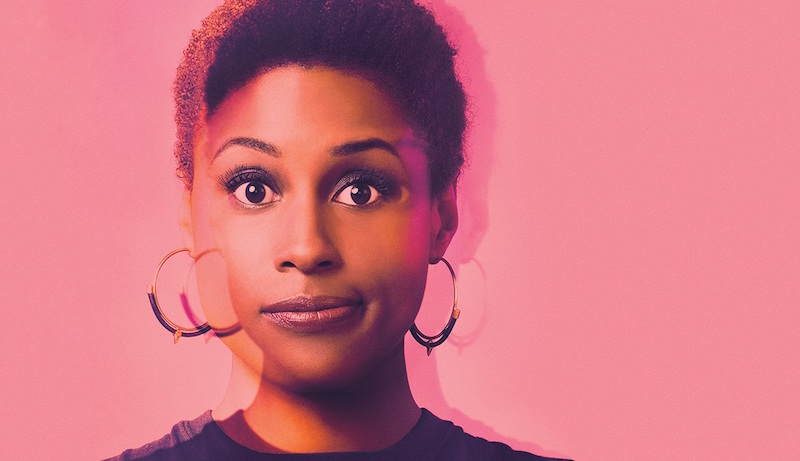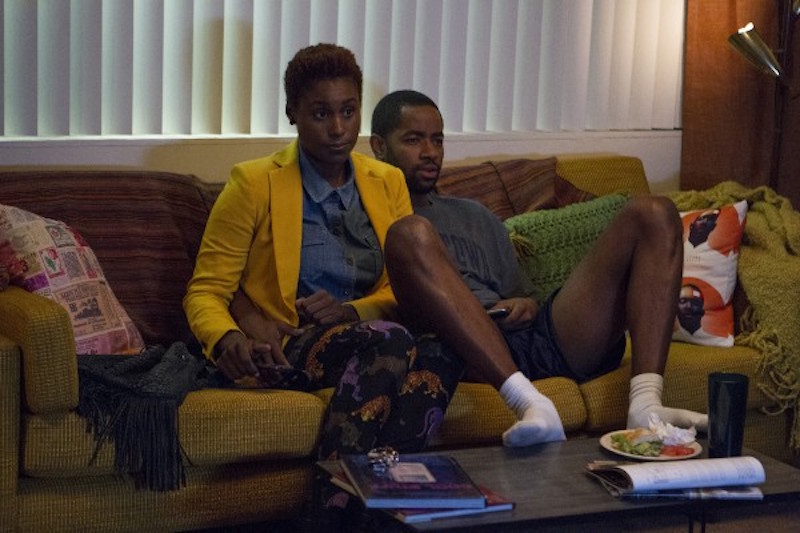THE BEAUTIFUL
BRILLIANCE OF
“INSECURE”
ISSA RAE’S HBO SERIES
IS A TREASURE
OF A SHOW
by Aya de Leon
The promos and trailers for Issa Rae’s new HBO series Insecure don’t do justice to the show. They can’t. Because the show is character-driven, and the characters are nuanced, textured, and beautifully drawn. They’re young Black adults we’ve never seen on television before.
The show launches from the wild success of Issa Rae’s YouTube series, The Misadventures of Awkward Black Girl, and her bestselling book of the same name. The web series was a wonderful, funny DIY project the Stanford grad made in her mid-20s. In the web series, Issa played J, a single twentysomething working for a diet pill company and navigating the awkwardness of office relationships and dating. The show went viral, and in 2013, HBO greenlit a series deal for her. Rae spent three years developing the series, and all that hard work has clearly paid off. The show’s humor is the stuff of real life, and its best jokes require more than a two-second setup and a one-second punchline. When I saw the premiere at the New Parkway Theater in Oakland, I liked it. But it was during the second episode—after I’d had a chance to follow the characters through two storylines—that I completely fell in love. Not only do we see nuanced portrayals of two young Black women, but we also see incredibly insightful and subtle portrayals of their Black male counterparts.
The show is cocreated by Issa Rae and comedian Larry Wilmore, and it revolves around 29-year-old Issa and her best friend Molly (Yvonne Orji) as they navigate daily life, work, and relationships. Issa works at a community nonprofit, while Molly is a high-powered corporate attorney. Molly is unhappy being single, while Issa has a loyal boyfriend, Lawrence (Jay Ellis) who can’t seem to get his act together.
To say that the show is unique is an understatement. But it’s not without antecedents. In Insecure, I see shades of Ellen DeGeneres (whose sitcom was the first I can recall that was built around female awkwardness), young Black professional women from Living Single, and the Black feminist comedy of Wanda Sykes. It also fits nicely alongside Girls, which has opened up space on TV for this generation of women’s awkward and explicit stories, and Shonda Rhimes’s Scandal and How to Get Away with Murder. Rhimes’s shows properly capture the gorgeousness of dark brown women, which requires a set of technical skills in an industry that is calibrated to the beauty of blonde white women.
Female awkwardness, young Black women trying to make it in the city, raunchy sisters, gritty millennial reality, and breakthroughs in showcasing dark brown beauty—I think of these factors as conspiring together to slap down Hollywood’s tradition of racism, sexism, classism, and colorism. This is not to say these aforementioned shows influenced Issa Rae directly; rather, their various successes came together to create the Hollywood that could even imagine making her show.
Yet Black women who fall outside the realm of what’s considered commercially attractive have occasionally been able to make their own place in Hollywood—as long as they’ve already built their own audiences they could bring with them. Whoopi Goldberg in the ‘80s and Queen Latifah in the ‘90s each built a following in comedy and hip hop, respectively, before landing screen roles. Once Black women have put in years of work building success, Hollywood is always willing to capitalize. But in the past, that never included a dark brown woman writing and starring in her own show. In this moment, this golden era of TV, such a thing is possible. Issa Rae worked for years to create and promote her own fantastic web series, and now she’s found a home in Hollywood.
I really cannot express just how refreshing the show is as an antidote to racism and colorism in Hollywood. Darker brown women have traditionally been sidelined in Hollywood, given roles as the funny friend or the crazy neighbor, but never the main character. How to Get Away with Murder is the first show in which we see two darker brown women in a large ensemble cast. In Insecure, we get to see two brown-skinned women fully occupying the center of a series. In particular, in a community where hair is profoundly politicized, it’s refreshing to see these women have different hairstyles: Issa has short natural hair and Molly has a long weave. Her short hair isn’t a point of tension in her relationship with her boyfriend, it’s just taken as a given that she’s desirable without conforming in any way to white beauty standards.
The conversation about colorism is openly on the table in the show. In the pilot, Molly notes how Black men are often interested in women of all colors, including mixed-heritage women, but aren’t interested in Black women who aren’t mixed. In another scene, a lighter-skinned woman is presented as complacent in her relationship, while Molly and Issa feel pressured to settle for less. We see both of them navigating dating and relationships in today’s hookup culture and struggling to be taken seriously by some of the men who interest them.
Not only does Insecure offer an expansive exploration of Black women’s experiences, it also expands mainstream TV narratives about socioeconomic class in the Black community. Starting in the ‘70s, when TV was being integrated, we got shows like Good Times and Sanford and Son, comedies about Black poor and working-class families. And of course, we had The Jeffersons, where George and Weezy were “movin’ on up,” but George continued to be a buffoon, a racial and class misfit whose ostensibly uncouth behavior was the butt of many of the jokes, playing to white anxiety about Black people moving in next door. In contrast, we had the ‘90s with the Black middle-class fantasy family: the Huxtables. Any white family should be delighted to have them next door. They were just hilarious and harmless. Their family was devoid of any kind of struggle. No encounters with racism. With two Black professional parents who seemed to have nothing but leisure time. It was the ultimate fantasy. And in recent years, I have argued that Bill Cosby’s reality was the shadow side of that fantasy. The lie in that world is that racism doesn’t really exist. And the truth of Bill Cosby is that sexual trauma is a huge part of our legacy from slavery—one that is acted out daily in sexual violence in our community. Part of the lure of the Huxtable fantasy is that struggle is optional.
In Insecure, struggle is inevitable, even for Black characters who have gone to college, who may have been raised middle class, or who may have high-powered professional careers. According to Issa Rae at the premiere, “The journey [the show’s characters take] is becoming comfortable in the fact that you may never be comfortable.” And this is what she portrays: the inevitable awkwardness of being human, or the search for financial security in today’s world. Another interesting subtle difference between the two lead characters has to do with their class backgrounds and class aspirations. Molly is raised in the hood and has become a high-powered attorney. As she says to one of her corporate clients: “They want us to be more environmentally responsible, but it’s like, seriously, why do we need trees?” In contrast, Issa is raised middle class and works for a nonprofit agency. Yet we see them both grapple with different flavors of racism on the job: liberal and conservative. Issa works for a community organization called We Got Y’all, and its staff mostly consists of white people, including a patronizing white executive director. At the premiere, Issa Rae called it her “nightmare non-profit” fueled by “white guilt.” The opportunities for scathing parody and social commentary are endless. Sometimes, it’s the little things. I missed this in the premiere, but noticed it in later episodes: In the We Got Y’all logo, there are silhouettes of kids of color being held up by a giant white hand. That just says it all.
Another thing I really appreciate about Insecure is the fact that we aren’t stuck only in the dating storyline like we were in Awkward Black Girl. With two female protagonists, we get to see one trying to get into a relationship and the other trying to figure out if she wants to stay in one. What does it mean to compromise, and is there a difference between that and settling? In a sexist and racist landscape that tells Black women they’re lucky to have any relationship, this is a crucial opportunity to see Black relationships beyond the honeymoon phase. Issa complains to Molly about her relationship: “There’s no excitement… Sometimes I wish he’d just, like, slap the shit out of me out of angry passion. Not really. But kind of.” Molly responds dryly: “So you’re an idiot. That’s cool.” In Issa, we get to see a young woman five years into her first long-term relationship. She compares her experiences to unrealistic expectations fueled by the distortions of romance, pornography, and rap videos, and the show utilizes imagery effectively to tell a more complex story. There is a visually stunning montage of the couple’s history on the couch they bought for their shared apartment that beautifully represents the challenges of maintaining intimate relationships. Yet the show is a comedy, and this piece of furniture is later referred to as a “bouch.” Trust me. It’s hilarious.
In questioning her relationship, we see a young woman doing what so many of us are conditioned to do: obsess about our relationships when there’s a larger void in our lives. Like in Awkward Black Girl, Issa writes and delivers hip hop rhymes into the mirror. At the premiere, I asked Issa Rae if there were plans to develop Issa as a hip hop artist. She responded that hip hop is solely a form of self-expression for the character. As an artist who has struggled to succeed, I am a sucker for stories about artists trying to make it. Issa Rae is brilliantly ambitious, and I wonder where that part of her autobiography might land in the series. I notice that ambition is often removed from female characters in media in general and comedy in particular. I was a fan of Whitney Cummings’s TV show Whitney until the character began to bore me because she didn’t really have a job. All this while Cummings was doing her own show and had a hand in another hit show, 2 Broke Girls. The absence of ambition in her own show bothered me. Issa Rae is definitely an ambitious writer and performer. And, unlike in Whitney, her character has a strong work storyline and is reaching for more out of life.
Issa Rae’s Insecure is a treasure of a show, a tribute to young Black womanhood that might never have happened in a previous era. But as Issa’s no-fucks-given rap persona might say: We here now, motherfuckers. Deal wid it!
+++++++++++
Writer Coco Peila contributed significantly to this article.
Aya de Leon is the author of the feminist heist novel Uptown Thief, which was published in July 2016. She blogs at ayadeleon.wordpress.com.




